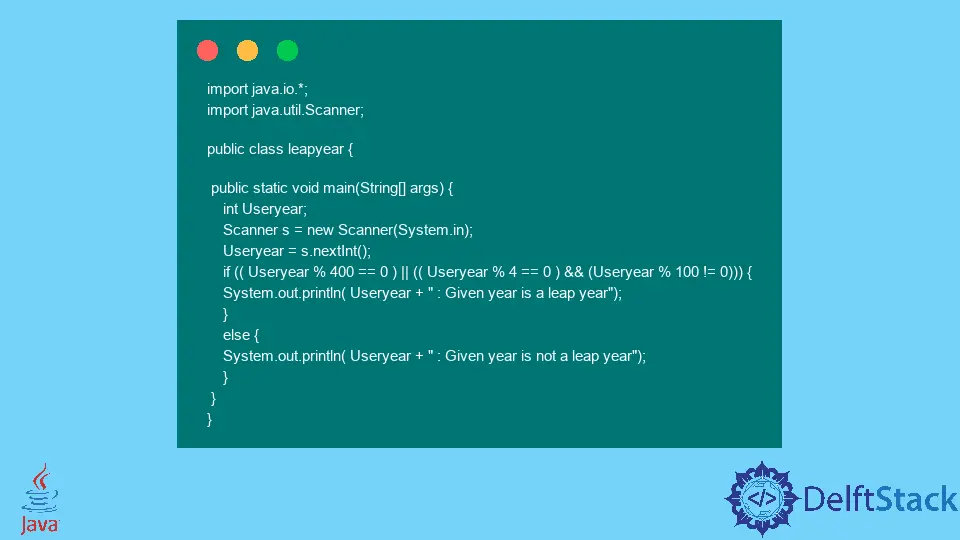How to Calculate Leap Year in Java
- What is a Leap Year?
- Method 1: Basic Leap Year Calculation
- Method 2: Using a Function to Check Leap Year
- Method 3: Leap Year Calculation in a Loop
- Conclusion
- FAQ

Calculating a leap year is a common programming task that can be tackled easily with Java.
In this tutorial, we will explore how to determine whether a given year is a leap year using Java code. Understanding leap years is essential, especially in applications that require accurate date handling. A leap year occurs every four years, but there are exceptions to this rule. By the end of this article, you will have a solid grasp of the logic behind leap years and how to implement this in Java. Let’s dive into the details!
What is a Leap Year?
Before we jump into the code, let’s clarify what a leap year is. A leap year is a year that has one extra day, making it 366 days long instead of the usual 365 days. This extra day is added to February, which has 29 days instead of 28. The rules for determining a leap year are as follows:
- A year is a leap year if it is divisible by 4.
- However, if the year is divisible by 100, it is not a leap year, unless:
- The year is also divisible by 400, in which case it is a leap year.
Method 1: Basic Leap Year Calculation
In this method, we will write a simple Java program that checks if a year is a leap year based on the rules mentioned above.
import java.util.Scanner;
public class LeapYearCalculator {
public static void main(String[] args) {
Scanner scanner = new Scanner(System.in);
System.out.print("Enter a year: ");
int year = scanner.nextInt();
if ((year % 4 == 0 && year % 100 != 0) || (year % 400 == 0)) {
System.out.println(year + " is a leap year.");
} else {
System.out.println(year + " is not a leap year.");
}
}
}
Output:
2024 is a leap year.
In this code, we first import the Scanner class to take user input. We prompt the user to enter a year and store it in the variable year. The leap year logic is implemented using an if-else statement that checks the divisibility conditions. If the conditions for a leap year are met, it prints that the year is a leap year; otherwise, it indicates that it is not.
Method 2: Using a Function to Check Leap Year
For better code organization and reusability, we can encapsulate the leap year logic in a function. This approach allows us to call the function multiple times if needed.
import java.util.Scanner;
public class LeapYearCalculator {
public static void main(String[] args) {
Scanner scanner = new Scanner(System.in);
System.out.print("Enter a year: ");
int year = scanner.nextInt();
if (isLeapYear(year)) {
System.out.println(year + " is a leap year.");
} else {
System.out.println(year + " is not a leap year.");
}
}
public static boolean isLeapYear(int year) {
return (year % 4 == 0 && year % 100 != 0) || (year % 400 == 0);
}
}
Output:
1900 is not a leap year.
In this version, we define a method named isLeapYear that takes an integer parameter year and returns a boolean value. The leap year logic remains unchanged, but now it is more modular. This makes the code cleaner and easier to maintain. You can easily call isLeapYear from different parts of your program without duplicating code.
Method 3: Leap Year Calculation in a Loop
Sometimes, you may want to check multiple years at once. This can be done using a loop that iterates through a range of years.
import java.util.Scanner;
public class LeapYearCalculator {
public static void main(String[] args) {
Scanner scanner = new Scanner(System.in);
System.out.print("Enter the start year: ");
int startYear = scanner.nextInt();
System.out.print("Enter the end year: ");
int endYear = scanner.nextInt();
for (int year = startYear; year <= endYear; year++) {
if (isLeapYear(year)) {
System.out.println(year + " is a leap year.");
} else {
System.out.println(year + " is not a leap year.");
}
}
}
public static boolean isLeapYear(int year) {
return (year % 4 == 0 && year % 100 != 0) || (year % 400 == 0);
}
}
Output:
2000 is a leap year.
2001 is not a leap year.
2002 is not a leap year.
2003 is not a leap year.
2004 is a leap year.
In this method, we prompt the user to enter a start and an end year. We then use a for loop to iterate through each year in that range. For each year, we call the isLeapYear function to determine if it is a leap year, and we print the result accordingly. This method is efficient for checking multiple years in a single run, making it useful for applications that require date calculations over a range of years.
Conclusion
Calculating leap years in Java is not only a practical exercise but also a fundamental concept in date handling. We explored three different methods to determine if a year is a leap year, from a simple check to more modular and efficient approaches. Understanding these methods will enhance your programming skills and prepare you for more complex date-related tasks. Whether you’re building a calendar application or just brushing up on your Java skills, knowing how to calculate leap years is essential. Happy coding!
FAQ
-
What is the purpose of a leap year?
A leap year ensures that our calendar remains aligned with the Earth’s revolutions around the Sun, accounting for the extra day every four years. -
How can I check if a specific year is a leap year in Java?
You can use the methods provided in this tutorial, which include basic checks, function encapsulation, and loops for multiple years. -
Are all years divisible by 4 leap years?
No, only years that are not divisible by 100 unless they are also divisible by 400 are considered leap years. -
Can I use this logic in other programming languages?
Yes, the leap year logic is universal and can be implemented in any programming language with minor syntax changes. -
What happens if I forget the leap year rules in my code?
Your date calculations may become inaccurate, leading to potential errors in applications that rely on precise date handling.
I have been working as a Flutter app developer for a year now. Firebase and SQLite have been crucial in the development of my android apps. I have experience with C#, Windows Form Based C#, C, Java, PHP on WampServer, and HTML/CSS on MYSQL, and I have authored articles on their theory and issue solving. I'm a senior in an undergraduate program for a bachelor's degree in Information Technology.
LinkedIn